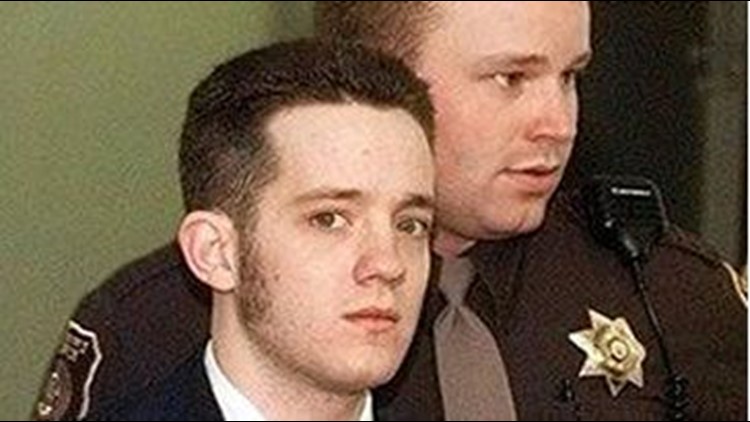The new production, which opens nationwide Oct. 12 at more than 130 theaters, features a segment based on more than 10 hours of face-to-face interviews with convicted killer Aaron McKinney, conducted by Greg Pierotti, a gay actor/writer who helped create the original docudrama.
According to the detailed notes taken by Pierotti and condensed into the new script, McKinney says he had been drawn to crime ever since childhood, feels sympathy for Shepard's parents and expresses regret that he let his own father down.
"As far as Matt is concerned, I don't have any remorse," McKinney is quoted as saying in the script, which was provided to The Associated Press by the production company.
McKinney, according to the script, reiterates his claim that the 1998 killing in Laramie, Wyo., started out as a robbery, but makes clear that his antipathy toward gays played a role.
"The night I did it, I did have hatred for homosexuals," McKinney is quoted as saying. He goes on, according to the script, to say that he still dislikes gays and that his perceptions about Shepard's sex life bolstered his belief that the killing was justified.
McKinney and his accomplice, Russell Henderson, targeted Shepard at a bar in Laramie in part because they assumed he was gay, according to the script.
"Well, he was overly friendly. And he was obviously gay," McKinney is quoted as saying. "That played a part ... his weakness. His frailty. And he was dressed nice. Looked like he had money."
Early on Oct. 7, 1998, McKinney and Henderson offered Shepard a ride in their car, then robbed and savagely pistol whipped him and left him tied to a fence in a remote area outside town. The 21-year-old University of Wyoming student was found 18 hours later and died in a Colorado hospital on Oct. 12.
The murder has become an iconic cornerstone of campaigns to raise awareness about violence against gays and to pass hate-crimes laws. Shepard's mother, Judy, has been an indefatigable campaigner, while "The Laramie Project" - which probed the murder and its aftermath through more than 200 interviews with Laramie residents - has become a well-known and widely viewed theatrical piece.
The New York-based Tectonic Theater Project, which created the original play, began work last year on the epilogue, titled "The Laramie Project: 10 Years Later." The company's artistic director, Moises Kaufman, said he wanted to find out how Laramie had changed in the years since the murder and his team reinterviewed many residents who figured in the earlier play.
More than 1,000 actors - amateur and professional - will be performing when the new show premieres next month on the 11th anniversary of Shepard's death. Participating theaters range from high school stages to New York's Lincoln Center, where Pierotti and other members of the original cast will perform.
Pierotti says he's still not sure if he will play himself in the segment about McKinney, a dialogue that will take about 11 minutes on stage. The script is a condensed and occasionally reordered version of Pierotti's notes from the prison; he says he tried to convey McKinney's words as accurately as possible given that he was not allowed to use a recorder. Officials at Wallens Ridge State Prison in Big Stone Gap, Va., confirmed the interviews.
The last time McKinney made public statements about the murder was in 2004, when he was interviewed by ABC's "20/20." That interview raised the possibility that the crime was motivated by drugs rather than anti-gay sentiment, and Kaufman said he wanted the epilogue to address people's views on whether the murder was a hate crime.
Pierotti said he visited McKinney once last November and twice more in July, speaking with him for more than three hours each time in the community visiting room at the maximum-security facility. McKinney and Henderson, both serving life sentences, are among several Wyoming inmates transferred to Virginia for logistical reasons.
Pierotti says he pressed McKinney several times on the question of remorse.
"Yeah, I got remorse. But probably not the way people want me to," McKinney is quoted as saying. "I got remorse that I didn't live the way my dad taught me to live."
According to the script, McKinney expresses empathy with Shepard's parents over the loss of their son, though he adds about Judy Shepard: "Still, she never shuts up about it, and it's been like 10 years."
"If I could go back and not be the one who killed him, I would," McKinney is quoted as saying. "But I am better off here, myself. I'm doing way better in here than I ever was out there."
Pierotti contacted McKinney through the intervention of the Rev. Roger Schmit, a Roman Catholic priest based in Laramie at the time of the killing. Schmit had many heartfelt talks with McKinney during jailhouse visits.
"When I visited Aaron, I felt there was a sense of remorse," Schmit said in a telephone interview from Kansas City, Mo., where he now lives. "He would often pray for Matthew, for Matthew's family."
Yet Schmit has seen a rehearsal of the new script and said he has no doubt it accurately portrays McKinney's current feelings.
"Of course, it's disappointing to me," Schmit said. "But I have confidence in his teachableness."
Pierotti said he found McKinney's demeanor and views unsettling at times, but also compelling to the point where he sought to build a level of mutual trust. For example, Pierotti chose to acknowledge to McKinney, at their last meeting, that he was gay, and recalls McKinney responding amicably, "I thought so."
"He's perfectly comfortable acknowledging he doesn't like gay people, and for me it was unnerving to experience his lack of remorse," Pierotti said. "Yet I feel very protective of him - not in an apologist way, but I see he has a lot of complexity. ... As an artist, it's more interesting to dig into who this person is."
In the script, Pierotti asks if McKinney, who is now 32, he expects to ever go free.
"Man, I'm never getting out of here," McKinney is quoted as responding. "I'm like the poster child for hate-crime murders. ... And you got to resign yourself to it or you go crazy."
© 2009 The Associated Press. All rights reserved. This material may not be published, broadcast, rewritten or redistributed. Learn more about our Privacy Policy.



